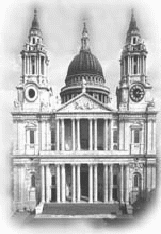 Part
3 The Church
Part
3 The Church Part
3 The Church
Part
3 The Church
The Church was not a homogeneous group marching with goose-step uniformity. They did not trim the corners of their beards to identify themselves from other groups, nor were they steeped in identifiable traditions of robes and rituals. They looked like Greeks, Samaritans, Jews, and gentiles. They looked like everyone because they were everyone and anyone who turned toward God’s kingdom, instead of the ways of the gentile governments.
They were heterogeneous and diversified. Yet, through their system of ministers and the teachings of Christ, they formed a self-disciplined network across the empire and beyond. That union of spirit and brotherhood was absolutely essential for their survival during the social, political, economic, and even geological catastrophes that plagued mankind during the decline and fall of the Roman Empire.
Identifying the Church from those who took that Name in vain is a matter of understanding what the Church truly was to be and do. What was the Church to be and do for the people who sought His Kingdom and desired to obey the commandments?
There were men in those early days who were called the Patristic writers of the Church. Men like Ambrose, Jerome, Augustine, and Gregory the Great. They are presented by some as the “patriarchs of the Church”. But are these patrons of Jesus Christ or did they take to a different path? Their philosophies often seem to contradict the teachings of Jesus as well as the traditions of the ancient Hebrews and the Bible itself.
Jerome, around 400 AD, believed that women were bad news for men and that they were uncontrollable, excessively passioned, and unreasonable. Although, these texts were enormously influential in defining the coming of what has been historically proclaimed as the Church in the medieval world, they seem to fly in the face of God’s creative instincts.
And the rib, which the LORD God had taken from man, made he a woman, and brought her unto the man. Genesis 2:22
Jerome inferred that women were inferior “they degraded men.”1
And Adam said, This [is] now bone of my bones, and flesh of my flesh: she shall be called Woman, because she was taken out of Man. Therefore shall a man leave his father and his mother, and shall cleave unto his wife: and they shall be one flesh. Genesis 2:23, 24
Women do not degrade men. A good woman is a blessing or a curse, depending on the heart and soul of the man. It is only weak, selfish, and proud men who blame their sin on God’s gift. The nature of women is not responsible for man’s sin of choice.
Another early author of this church sect was Ambrose. By the voice of the people, Ambrose was elected as bishop of Milan. But these were “instant Christians”2 ,formed at the emperor's command, not by repentance.
Ambrose, was the son of the governor of Gaul and a former high Roman official. He had asked the emperor if he could become Bishop of Milan and was granted that right by this self-appointed Bishop of Bishops. Before Ambrose could accept this position, he had to take time to research what Christianity was, for he had no idea. He returned sometime later with his own doctrines.
Ambrose considered a bishop as an “aristocratic figure” and formulated the Church according to the “ways of Rome issuing decrees, edicts, and commands”, rather than serving as a subject, minister, and servant of the people. He also displayed a fierce hatred of women that was carried into the middle ages. He was intolerant of other religions and actually argued in the Roman Senate that all other religions should be stamped out. This seems in direct opposition to the teachings of Jesus. The idea that other religions should be persecuted by Roman force and policy seems to fly in the face of the injustice of the Crucifixion itself.
Touch not; taste not; handle not; Which all are to perish with the using; after the commandments and doctrines of men? Colossians 2:21-22
These people, by a majority vote, chose a single, top-down ruling bishop for thousands and, at the command of a tyrant and his Edict of Milan, were not Christians of repentance, although, they may have been baptized with water and fanfare. The Milan Church, its hierarchy of authority, was established by the spirit and character of Constantine, not by Christ. Much of what we see as the Church has come down through this tainted religion and apostasy. To understand the Church and its position in the Kingdom of God, we must go back to its origin, which is Christ, not Constantine.
Ye are bought with a price; be not ye the servants of men. 1 Corinthians 7:23
1World Civilizations Richard Hooker http://www.wsu.edu:8080/~dee/CHRIST/EUROPE.HTM
2Instant Christians. Just add water. Then Peter said unto them, Repent, and be baptized every one of you in the name of Jesus Christ for the remission of sins, and ye shall receive the gift of the Holy Ghost. Acts 2:38